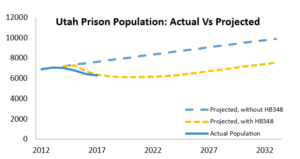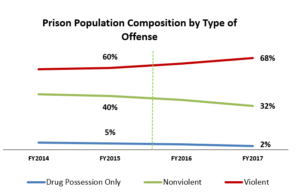
Two years after criminal justice reforms in Utah went into effect, a new report from the state’s Commission on Criminal and Juvenile Justice (CCJJ) confirms that Utah is on the right track to achieving the anticipated public safety outcomes from the policy changes:
- Prison Population Decreasing: The state’s prison population has decreased, consistent with projections, with the prison population 18 percent lower than the population was projected with the status quo.
 Focusing on Serious and Violent Offenders: The state is shifting its prison resources to focus on more serious and violent offenders. From FY 2015 to FY 2017, the percentage of nonviolent offenders in Utah’s prison population decreased by 20 percent, and the number of individuals entering prison for a new drug possession or other nonviolent offense is down sharply. This decrease allows the state to focus prison resources on more serious and violent offenders.
Focusing on Serious and Violent Offenders: The state is shifting its prison resources to focus on more serious and violent offenders. From FY 2015 to FY 2017, the percentage of nonviolent offenders in Utah’s prison population decreased by 20 percent, and the number of individuals entering prison for a new drug possession or other nonviolent offense is down sharply. This decrease allows the state to focus prison resources on more serious and violent offenders.
 Emphasis on Treatment At the same time, the state is emphasizing treatment, rather than incarceration, for offenders with substance abuse and mental health needs that are driving their behavior. The state appropriated an additional $4.5 million each year for community-based treatment in FY 2016 and FY2017, and is beginning to see results from the investment: for justice-involved clients,
Emphasis on Treatment At the same time, the state is emphasizing treatment, rather than incarceration, for offenders with substance abuse and mental health needs that are driving their behavior. The state appropriated an additional $4.5 million each year for community-based treatment in FY 2016 and FY2017, and is beginning to see results from the investment: for justice-involved clients,
- admissions to all forms of substance use treatment are up 20 percent,
- the number accessing residential treatment is up 29 percent, and
- the number served in mental health treatment has increased 21 percent since FY 2015.
CJI, in partnership with the Pew Charitable Trusts, worked closely with criminal justice system stakeholders during the development of HB 348, Utah’s Justice Reinvestment legislation. The state passed HB 348 in 2015, seeking to address unsustainable growth in the state’s prison population, which rose six times faster than the national average in the decade preceding reforms, and improve public safety outcomes by emphasizing treatment and reducing recidivism.
Passage of the bill followed a year-long, bipartisan review of Utah’s sentencing and corrections data, policies and programs. CJI, with support from the Department of Justice, has assisted the state through the implementation process by helping agencies develop internal policies and procedures, providing training on evidence-based practices, and supporting the tracking and analysis of performance data.